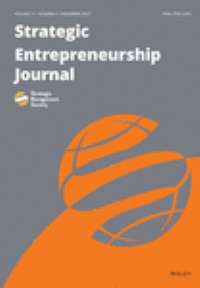Anti‐labor environments and employee entrepreneurship: Evidence from right‐to‐work laws
IF 6.3
2区 管理学
Q1 BUSINESS
引用次数: 0
Abstract
Research SummaryWe explore how changes in labor unions and related labor environments affect employees' likelihood of starting a new business. We suggest that the enactment of stringent anti‐union laws reduces incentives for employees to stay with their respective workplaces and increases the attractiveness of becoming self‐employed. Using the adoption of right‐to‐work (RTW) laws in Michigan and Indiana as a quasi‐natural experiment, we find that the likelihood of employees becoming self‐employed increased by 53% compared with that of states without RTW laws. Moreover, this tendency is more pronounced for blue‐collar and low‐wage workers who start unincorporated businesses. These findings offer novel insights on the relationship between anti‐labor environments and necessity‐driven entrepreneurship by focusing on individual‐level incentives in non‐knowledge‐intensive sectors.Managerial SummaryChanges in employment conditions influence employees to consider starting their own businesses, yet our understanding of how these changes drive individuals toward entrepreneurship remains limited. This study explores how weakened labor union power affects workers' engagement in entrepreneurial activities, with a focus on the types of employees impacted and the businesses that they start. By examining the adoption of RTW laws in Michigan and Indiana, we find that weakened labor union power disproportionately affects blue‐collar and low‐wage workers, increasing their likelihood of starting unincorporated businesses. These results suggest that managers and policymakers should consider the challenges faced by these workers and how changes in employment conditions may shape their career choices.反劳动环境与员工创业:来自工作权利法的证据
研究总结我们探讨了工会和相关劳动环境的变化如何影响员工创业的可能性。我们建议制定严格的反工会法,减少员工留在各自工作场所的动机,增加自我雇佣的吸引力。我们将密歇根州和印第安纳州采用工作权(RTW)法作为准自然实验,发现与没有RTW法的州相比,雇员成为自雇者的可能性增加了53%。此外,这种趋势在蓝领和低薪工人中更为明显,他们创办了非法人企业。这些发现通过关注非知识密集型行业的个人层面激励,为反劳动环境和必要性驱动型创业之间的关系提供了新的见解。就业条件的变化会影响员工考虑自己创业,然而我们对这些变化如何推动个人创业的理解仍然有限。本研究探讨了工会权力削弱如何影响工人参与创业活动,重点关注受影响的员工类型和他们创办的企业。通过对密歇根州和印第安纳州采用RTW法的研究,我们发现工会力量的削弱对蓝领和低薪工人的影响不成比例,增加了他们创办非法人企业的可能性。这些结果表明,管理者和政策制定者应该考虑这些工人面临的挑战,以及就业条件的变化如何影响他们的职业选择。
本文章由计算机程序翻译,如有差异,请以英文原文为准。
求助全文
约1分钟内获得全文
求助全文
来源期刊

Strategic Entrepreneurship Journal
Multiple-
CiteScore
11.10
自引率
1.60%
发文量
31
期刊介绍:
The Strategic Entrepreneurship Journal is a research journal that publishes original work recommended by a developmental, double-blind review process conducted by peer scholars. Strategic entrepreneurship involves innovation and subsequent changes which add value to society and which change societal life in ways which have significant, sustainable, and durable consequences. The SEJ is international in scope and acknowledges theory- and evidence-based research conducted and/or applied in all regions of the world. It is devoted to content and quality standards based on scientific method, relevant theory, tested or testable propositions, and appropriate data and evidence, all replicable by others, and all representing original contributions. The SEJ values contributions which lead to improved practice of managing organizations as they deal with the entrepreneurial process involving imagination, insight, invention, and innovation and the inevitable changes and transformations that result and benefit society.
 求助内容:
求助内容: 应助结果提醒方式:
应助结果提醒方式:


